The extraordinary legacy of baby Rose Jessica Dagan, who lived for just 20 days
Rose Jessica Dagan lived for just 20 days and tragically died just 30 minutes after this picture with her loving parents was taken, but she’s left an extraordinary legacy.
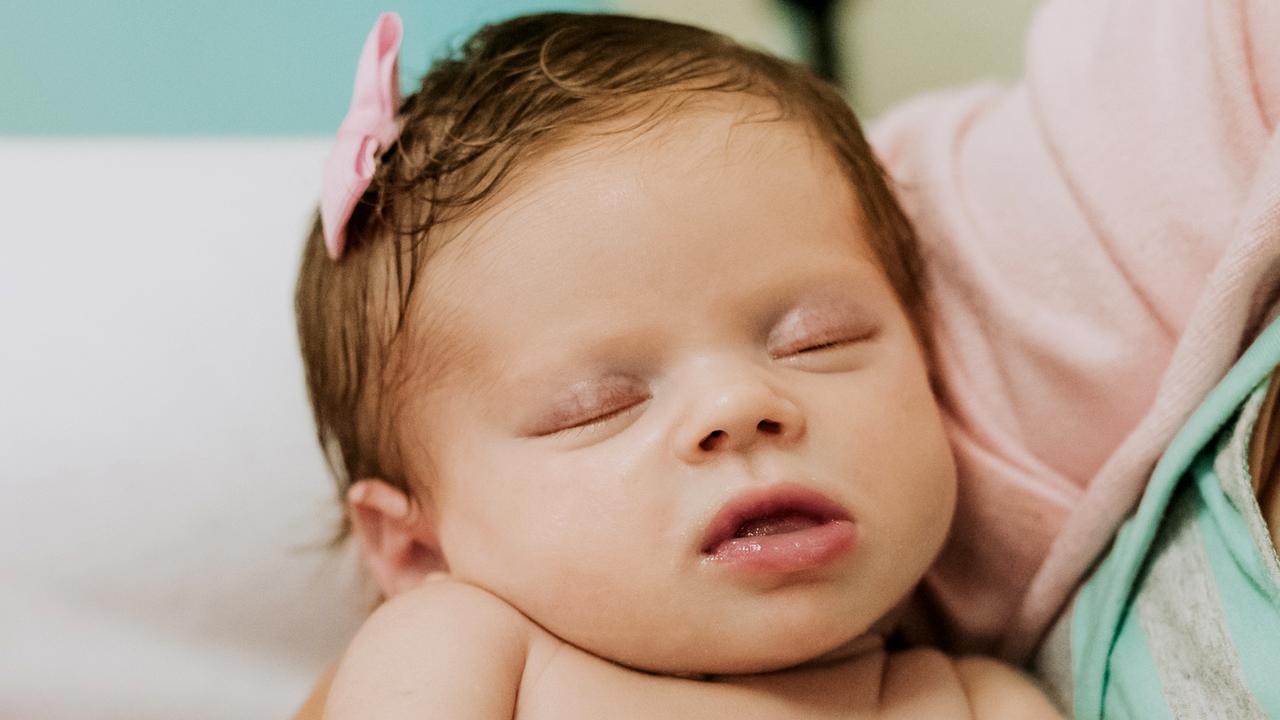
QWeekend
Don't miss out on the headlines from QWeekend. Followed categories will be added to My News.
Rose Dagan opened her eyes one last time. For several precious minutes, she gazed into her parents’ faces, curling her tiny fingers around theirs, giving one a squeeze, then taking another into her grip.
Half an hour later, the little girl with a head full of chocolate brown hair, tinged with auburn, was gone, wrapped in her parents’ arms.
On the outside, she was perfect. But Rose was born with congenital acinar dysplasia, an extremely rare condition resulting in her lungs failing to develop properly. Three days before she died, her parents were given the devastating news – Rose’s condition was “not compatible with life”. They were yet to hold her for the first time.
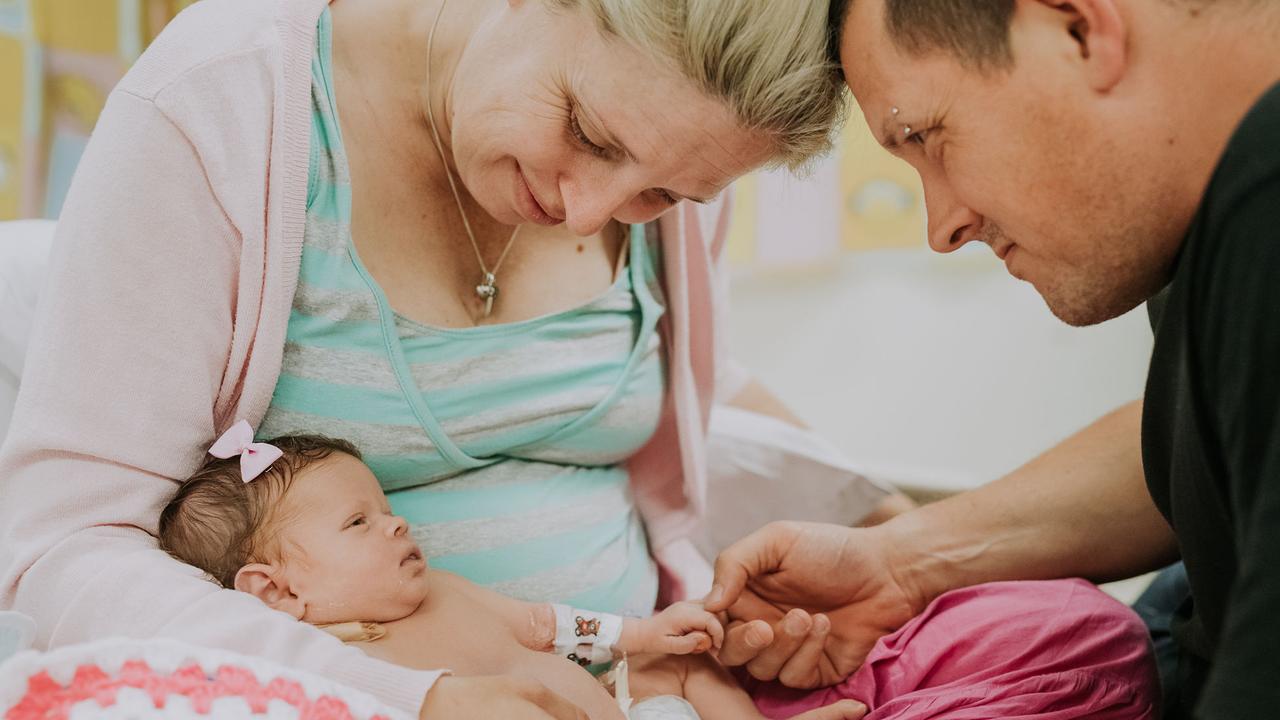
Brisbane couple Michelle and Daniel Dagan’s “surprise” baby – their third child after daughter Mia, then 6, and son Elijah, 4 – lived for just 20 days. Far too little time, but just long enough to create some cherished memories.
Time for Michelle, a talented community theatre performer, to sing to her – Bette Midler’s “The Rose”, “Rainbow Connection” from The Muppet Movie and “Close to You” by the Carpenters, among Rose’s playlist.
Time for Mia and Elijah to lie down beside her as Mia read some of the family’s favourite children’s stories, including “Little Miss Hug”.
Time for cuddles with her Mum and Dad and to meet grandparents, uncles, aunts, cousins. Time for one of her nurses to find a little pink bow to put in her hair. Time to be loved.
Rose, who was conceived while Michelle was taking the contraceptive pill and in her mid-40s, surprised them until the end.
Before doctors at the Queensland Children’s Hospital removed the wires and tubes and machines that had been keeping her alive since birth, her parents were warned to expect their daughter’s passing to be “pretty quick”.
But Rose Jessica Dagan, named after both her maternal great grandmothers, Rosina and Jessie, defied expectations.
She lived for two-and-a-half hours after the ventilator was switched off, waking and opening her eyes 30 minutes before she died.
“It was the most beautiful moment – really, really special,” Michelle recalls, struggling to hold back tears. “It was just so unexpected. She looked in our eyes and squeezed our fingers. It was really lovely because it felt like goodbye.
“It’s so strange to say that such a tragic time in your life was also really beautiful. But it was.”
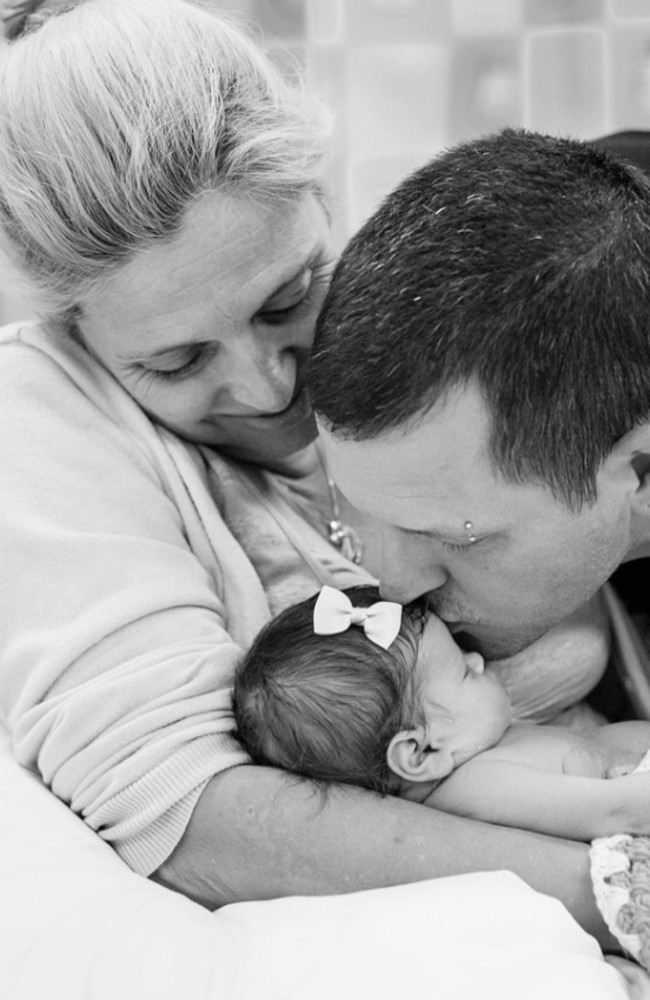
Throughout her life, the Dagans made sure Rose was never alone. From the moment she was born by caesarean section at Greenslopes Private Hospital at 8.40am on November 13, 2018, someone had always been with her.
As Michelle recovered from the surgery, Daniel went with their daughter to the Greenslopes special care nursery and then followed her to the Mater Mothers’ Hospital.
Hours later, he was by Rose’s side after she was transferred to the Queensland Children’s Hospital. She was not yet a day old.
“I remember I made him take the little pink unicorn that we’d brought with us to give her,” Michelle says.
“He was her person. I’ve always thought that. That’s why I made sure when we were finally able to cuddle her that he had the first cuddles.
“I had organised that with the nurses from the get-go. I just felt it was something special for him.”
After Rose died in the Queensland Children’s Hospital intensive care unit, as the Dagans went to pack up their in-house emergency accommodation and prepare to return home to be with their other children, Michelle was reluctant to leave her baby daughter by herself.
So she turned to the hospital staff, the people who had cared for Rose throughout her short life, asking them if they could “please stay” with her baby.
“They were like: ‘Yep. No problem. We’ll make that happen for you’,” Michelle says.
When the grieving couple returned about three-quarters of an hour later, they panicked when they could not see Rose on her bed.
But then they walked into her room and found her snuggled in the arms of one of the state’s leading paediatric intensive care unit (PICU) specialists, Adrian Mattke, her doctor. He was sitting back in a recliner chair talking to Rose, and patting her, as if she was still a living baby.
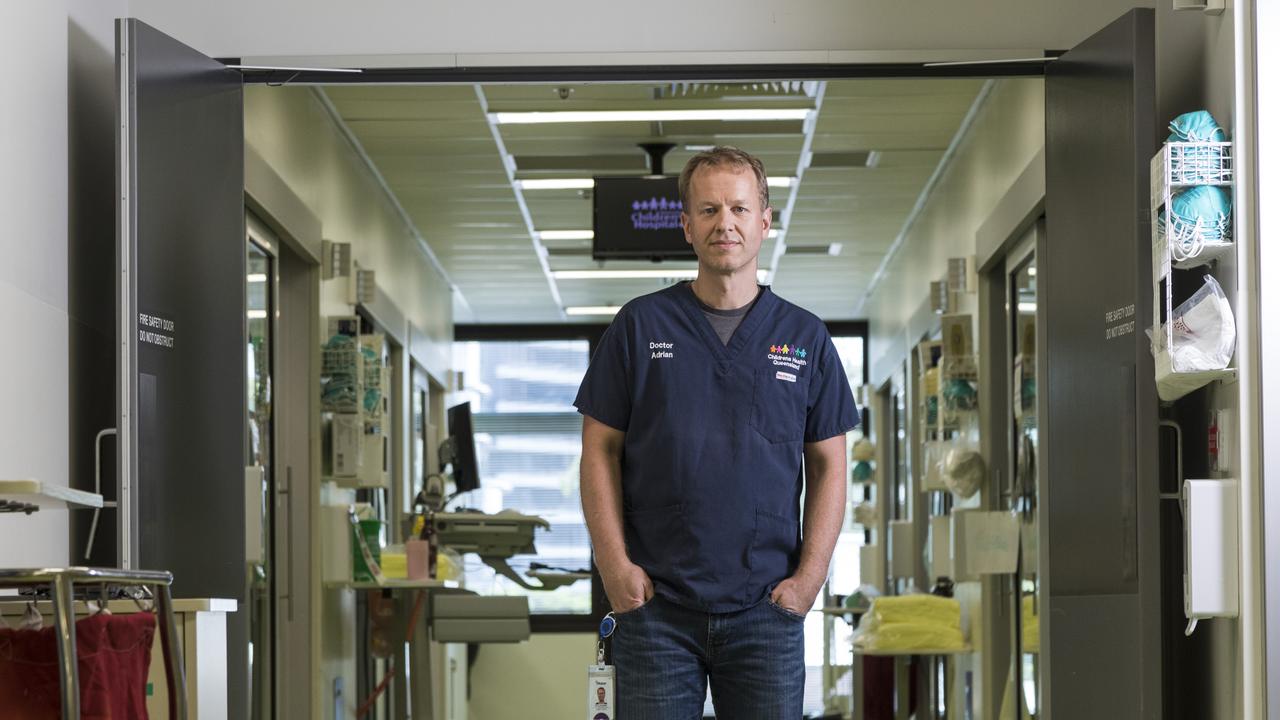
“It was a really, really defining moment,” Michelle says. “It so summed up our time there – just how beautiful they all were and how much they all cared about her. It was amazing.
“To come into that room and to see him sitting there after having that moment of ‘ah, sucking the air in, she’s been taken away already.’ And she hadn’t.
“She was being held and cared for and loved. It makes such a huge difference. It was just one of those times where you go: ‘Yep, that’s what makes PICU, PICU’.”
Six days later, 150 people turned up to the Dagans’ backyard at Michelton, in Brisbane’s northwest, for Rose’s funeral, including the doctor who delivered her, obstetrician Brad Robinson.
In the weeks after Rose’s death, Dr Robinson was the man the Dagans confided in about their wish to have another baby. The odds of them conceiving again naturally, he told them honestly, was “less than one per cent”.

But Michelle fell pregnant again within weeks and Robinson delivered Eva Rose Dagan on September 19, 2019, 10 months after her sister’s birth.
“It’s strange how comfortably joy and sorrow sit beside each other,” Michelle says of her pregnancy with Eva.
“My motto all the way through was: ‘Live inside the hope’. I managed to stay positive throughout the whole pregnancy. I think believing that Eva is a gift from Rose made that easier. I miss Rose terribly, but I also know that I would not have Eva if Rose, and everything that happened, hadn’t happened.
“We certainly weren’t looking at having any more children and then Rosie came along.
“She had to leave us so she found us the sweetest, happiest soul she could, and sent her down as quickly as she could, to help heal our hearts. And that’s Eva. We truly believe that.”
When the time is right, the Dagans will sit down with Eva and tell her about Rose. Until then, they’re enjoying their gorgeous little curly-top, who makes them laugh.
“She’s a firecracker,” Michelle says. “She cracks me up. She just makes me happy. I look forward to telling Eva all about Rose. I love talking about Rose.”
After Rose’s death, the devoted Mum was supported by Belmont Private Hospital’s Brisbane Centre for Postnatal Disorders, where she had attended group therapy programs since experiencing anxiety soon after Elijah was born in 2014. She spent a fortnight as an inpatient there when he was 18 months old.
“I’d been doing so well and had come through after Rose so well,” she says. “One of the things that they teach you … is that gratitude is a really good tool to have in your toolbox and after Rose, I really practised a lot of gratitude.
“Even now, I feel that. I know that the positivity and the gratitude was what got me through after her and through Eva’s pregnancy.”
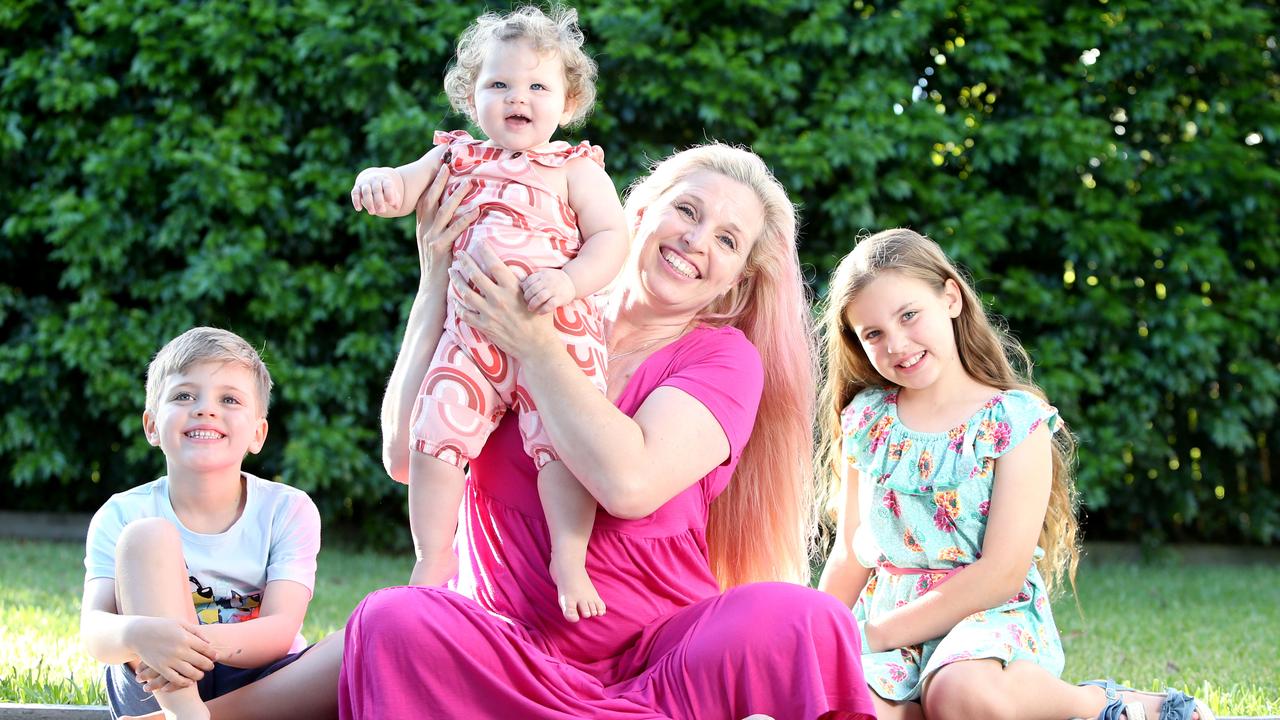
But then the coronavirus pandemic hit and while Daniel was working long hours from home as an information technology consultant, Michelle found herself home schooling Mia and Elijah, on top of looking after Eva, who was not sleeping well.
Belmont Private’s day therapy programs went from being face-to-face to Zoom meetings that Michelle was unable to access because of her home schooling commitments.
“A lot of my professional support systems had been knocked out from underneath me,” she says.
“I really missed having that support system that Belmont gave me. It was just really difficult to look after myself because I was looking after so much else. It just came to a point where I obviously needed more support.”
Last July, she ended up back as an inpatient at Belmont, which houses Queensland’s only private inpatient service for post-natal disorders at Carina Heights, in Brisbane’s southeast.
“It honestly has been such a godsend – to know that it’s there,” she says.
Figures provided by the hospital show a significant surge in women accessing programs for post-natal services during the pandemic, including Mums needing in-patient support.
Between March and October 2019, the post-natal disorders’ ward at Belmont cared for 96 inpatients. That rose to 108 during the same period last year at the peak of the COVID-19 crisis – a 12.5 per cent increase.
In the same nine months in 2019, 1403 new Mums attended day therapy programs run by the hospital’s Brisbane Centre for Postnatal Disorders. That jumped to 1643 in 2020 – a hike of more than 17 per cent.
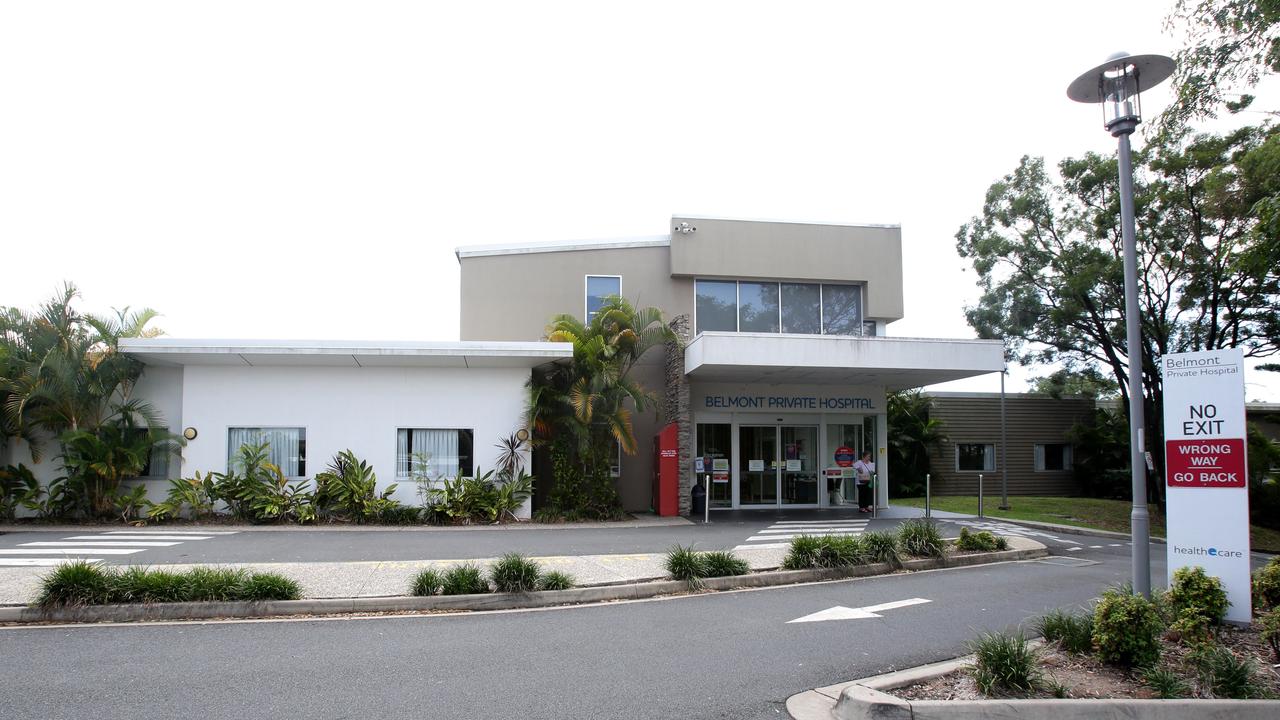
Queensland Health data shows public facilities also saw a spike in demand for maternal mental health services during the pandemic.
The Metro North and Gold Coast hospital and health services both reported increases in 2020 compared with 2019.
Referrals to the Gold Coast University Hospital’s Lavender Mother and Baby Unit, an inpatient facility, more than doubled during the pandemic year.
And in July last year alone, the Metro North HHS, which takes in the Royal Brisbane and Women’s Hospital, saw referrals to its peri-natal mental health services soar by almost 50 per cent compared with 2019.
Monthly peri-natal mental health referrals to Metro North continue to be high with numbers in December 2020 and January this year up 20 per cent compared to 12 months ago.
Belmont Private psychologist Gaye Foster says the first 12 months after giving birth is a woman’s most vulnerable time for developing a mental health issue.
“Obviously, Michelle’s story is quite unique,” Ms Foster says.
“That’s not the story we see all the time. It’s an illness that many women succumb to but they’re so different in their experience of it.”
Foster says COVID-19 meant the vision of motherhood many women had longed for was derailed.
“Their expectation of what their new Mum experience would look like was turned upside down, or at least pivoted in another direction,” she says.
“Some of the stories I’ve heard from the Mums, especially when they’re from another culture – their mothers or in-laws may be overseas, and would normally have come to help, but can’t get here.
“All those expectations of support didn’t eventuate.
“When you’ve got Mums who already have a vulnerability to mental health issues – a high percentage of women with postnatal depression have some sort of history of depression or anxiety in the past – adding the impact of the pandemic onto that, they’re more likely to become unwell.”
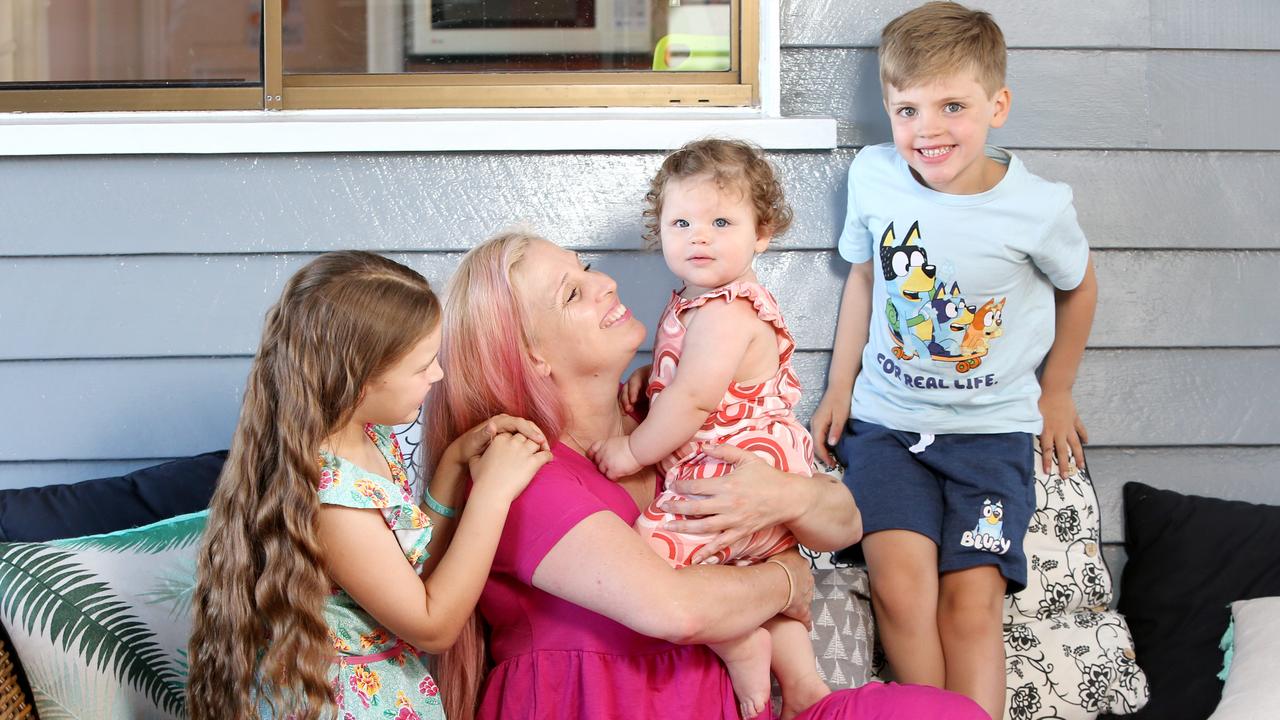
Seven months after her Belmont admission, Michelle is “feeling good” and has started working as a children’s swimming instructor. Her bond with Daniel is stronger than ever.
“Rose brought us closer,” she says. “I know that things like that can tear you apart. It definitely brought us closer.”
Mia, now 9, and Elijah, 7, still talk about Rose regularly.
“The hardest thing I’ve ever done was telling them that their sister wasn’t coming home,” Michelle says.
“That was devastating, utterly devastating. But they’re amazingly resilient. I think that’s because we always let them talk about Rose. She’s very much a part of us.”
The Mum of four, including “guardian angel” Rose, remains close to other mothers who were in Belmont Private at the same time and still attends weekly therapy programs.
“I’ve always been very open about this whole mental health journey and post-natal depression because I’ve met so many amazing women, highly intelligent, just incredible women, through it,” she says.
“A lot of women are having babies when they’re older. They’ve got careers and they’re very much in control of their lives – then they have a baby. All of a sudden, you really are not in control of your life anymore. I think it takes a lot of people by surprise.
“I’ve also had friends who’ve gone through in vitro fertilisation and they’ve been surprised that when the baby comes that it’s different to how they’d always imagined it would be.
“They’ve been working so hard on the pregnancy for so long that they weren’t really focused on the baby actually being here.”
Michelle thinks of the little girl she nicknamed rosebud often. Sunbeams created as the sun shines through gaps in clouds particularly remind her of her littlest ray of sunshine.
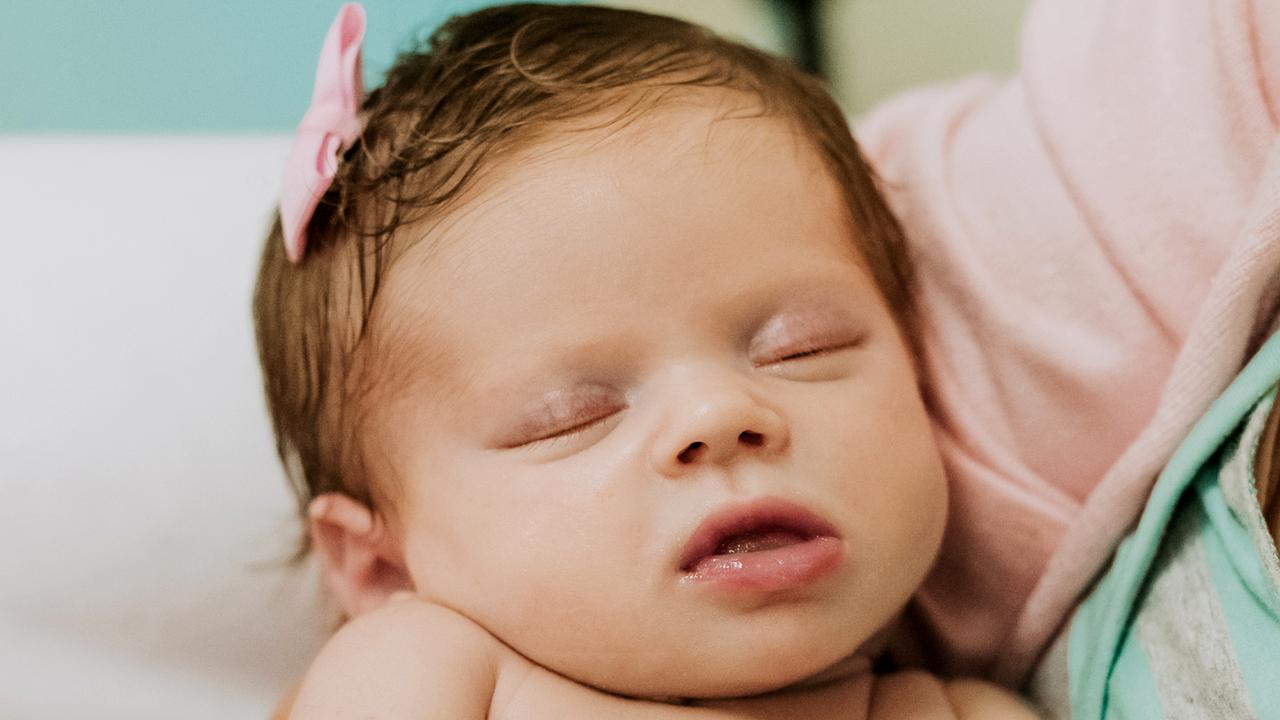
Growing roses has become her new obsession. She has a yellow one called Little Ray of Sunshine, her slowest growing variety and the only one that is yet to bud.
“It’s making me work hard, that’s for sure,” she says.
But she’s hopeful of a bloom soon in memory of a little girl who lived for just 20 days but touched many more hearts.
For more information about Belmont Private’s peri-natal disorder services: belmontprivate.com.au/specialties/perinatal-disorders/treatment-for-perinatal-disorders
To donate to the Children’s Hospital Foundation in memory of Rose Dagan:
fundraise.childrens.org.au/fundraisers/michelledagan/rosebud





